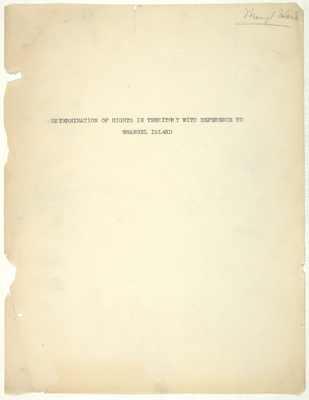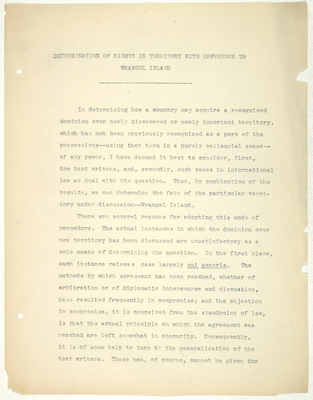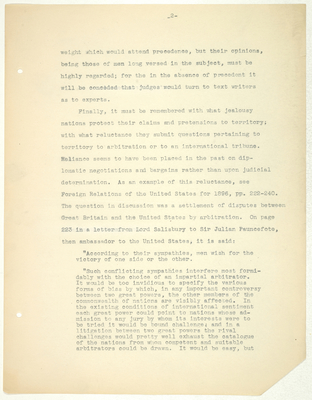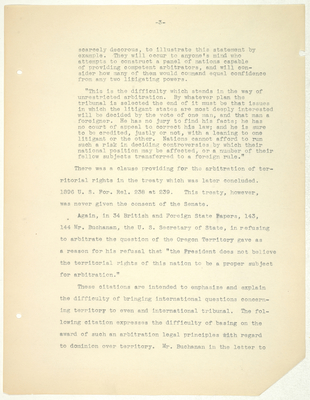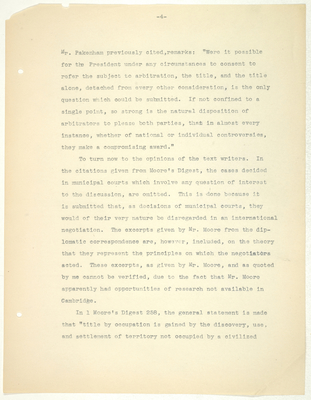Pages
stefansson-wrangel-09-37-001
Last edit 2 months ago by Samara Carystefansson-wrangel-09-37-002
DETERMINATION OF RIGHTS IN TERRITORY WITH REFERENCE TO
------------------------------------------------
In determining how a country may acquire a recognized dominion over newly discovered or newly important territory, which has not been previously recognized as a part of the possession--using that term in a purely colloquial sense-- of any power, I have deemed it best to consider, first, the text writers, and, secondly, such cases in international law as deal with the question. Then, by combination of the results, we can determine the fate of the particular territory under discussio--Wrangel Island.
There are several reasons for adopting this mode of procedure. The actual instances in which the dominion over new territory has been discussed are unsatisfactory as a sole means of determining the question. In the first place, each instance raises a case largely sui generis. The methods by which agreement has been reached, whether of arbitration or of diplomatic intercourse and discussion, have resulted frequently in compromise; and the objection to compromise, it is conceived from the standpoint of law, is that the actual principle on which the agreement was reached are left somewhat in obscurity. Consequently, it is of some help to turn to the generalization of the text writers. These men, of course, cannot be given the
stefansson-wrangel-09-37-003
-2-
weight which would attend precedence, but their opinions, being those of men long versed in the subject, must be highly regarded; for the in the absence of predcedent it will be conceded that judges would turn to text writers as to experts.
Finally, it must be remembered with what jealousy nations protect their claims and pretensions to territory; with what reluctance they submit questions pertaining to territory to arbitration or to an international tribune. Reliance seems to have been placed in the past on diplomatic negotiations and bargains rather than upon judgicial determination. As an example of this reluctance, see Foreign Relations of the United States for 1896, pp. 222-240. The question in discussion was a settlement of disputes between Great Britain and the United States by arbitration. On page 223 in a letter from Lord Salisbury to Sir Julian Pauncefote, then ambassador to the United States, it is said;
"According to their sympathies, men wish for the victory of one side or the other.
"Such conflicting sympathies interfere most formidably with the choice of an impartial arbitrator. It would be too invidious to specify the various forms of bias by which, in any important controversy between two great powers, the other members of the commonwealth of nations are visibly affected. In the existing conditions of international sntiment each great power could point to nations whose admission to any jury by whom its interests were to be tried it would be bound challenge; and in a litigation between two great powers the rival challeges would pretty well exhaust the catalogue of the nations from whom competent and suitable arbitrators could be drawn. it would be easy, but
stefansson-wrangel-09-37-004
-3-
scarcely decorous, to illustrate this statement byexample. They will occur to anyone’s mind who attempts to construct a panel of nations capable of providing competent arbitrators, and will consider how many of them would command equal confidence from any two litigating powers.
’’This is the difficulty which stands in the way of unrestricted arbitration. By whatever plan the tribunal is selected the end of it must be that issues in which the litigant states are most deeply interested will be decided by the vote of one man, and that man a foreigner. He has no jury to find his facts; he has no court of appeal to correct his law; and he is sure to be credited, justly or not, with a leaning to one litigant or the other. Nations cannot afford to run such a risk in deciding controversies by which their national position may be affected, or a number of their fellow subjects transferred to a foreign rule."
There was a clause providing for the arbitration of territorial rights in the treaty which was later concluded. 1896 U. S. For. Rel. 238 at 239. This treaty, however, was never given the consent of the Senate.
Again, in 34 British and Foreign State Papers, 143, 144 Mr. Buchanan, the U. S. Secretary of State, in refusing to arbitrate the question of the Oregon Territory gave as a reason for his refusal that "the President does not believe the territorial rights of this nation to be a proper subject for arbitration."
These citations are intented to emphasize and explain the difficulty of bringing international questions concern- ing territory to even and international tribunal. The following citation expresses the difficulty of basing on the award of such an arbitration legal principles with regard to dominion over territory. Mr. Buchanan in the letter to
stefansson-wrangel-09-37-005
-4-
Mr. Pakenham previously cited,remarks: "Were it possible for the President under any circumstances to consent to refer the subject to arbitration, the title, and the title alone, detached from every other consideration, is the only question which could be submitted. If not confined to a single point, so strong is the natrual disposition of arbitrators to please both parties, that in almost every instance, whether of national or individual controversies, they make a compromising award."
To turn now to the opinions of the text writers. In the citations given from Moor's Digest, the cases decided in municipal courts which involve any question of interest to the discussion, are omitted. This is done because it is submitted that, as decisions of municipal courts, they would of their very nature be disregarded in an international negotiation. The excerpts, as given by Mr. Moore, and as quoted by me cannot be verified, due to the fact that Mr. Moore apparently had opportunities of research not available in Cambridge.
in 1 Moore's Digest 258, the general statement is made that "title by occupation is gained by the discovery, use, and settlement of territory not occupied by a civilized
